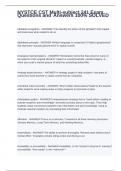NYSTCE CST Multi-subject 241 Exam Questions and Answers 100% SOLVED
Alphabet recognition - ANSWER-*Can identify the letters of the alphabet* both capital and lowercase when asked to do so
Alphabetic principle - ANSWER-Written language is comprised of *letters (graphemes)* that represent *sounds (phonemes)* in spoken words
Analogical representations - ANSWER-*Declarative memories that preserve many of the aspects of the original stimulus* (object or event).Example: mental imagery i.e., when you recall a mental picture of what the something looked like.
Analogy-based phonics - ANSWER-A strategy taught to help students *use parts of words they have learned* to attack words that are unfamiliar
Anecdotal notes (records) - ANSWER-*Short written observations*made by the teacher while student's work making notes on their progress to look back at later.
Anticipation guides - ANSWER-Comprehension strategy that is *used before reading to activate students' prior knowledge* and build curiosity about a new topic. They help students make connections between new information and prior knowledge. Used to motivate reluctant readers by stimulating their information
Attention - ANSWER-*Focus on a stimulus.* Involved in all three memory processes: Sensory Memory, Long-Term Memory, and Working Memory.
Automaticity - ANSWER-The ability to perform thoroughly *learned tasks without much mental effort.* Examples include riding a bike and driving a car.
Availability vs accessibility - ANSWER-Availability: is info *stored in long term* memory?
Accessibility: *how easily* is info *retrieved*? Balanced literacy models - ANSWER-Strategies teachers use to allow for *different learning styles*
Bias uncovering - ANSWER-*Question sources* writer uses, use of *fact or opinions* to support claim, what was *left out*, how they *address contrary evidence* or opinions.
Blend - ANSWER-A sequence of *consonants before or after a vowel* in each syllable
Bloom's 1st level - ANSWER-*Remember* (Recognizing, Recalling)
Bloom's 2nd level - ANSWER-*Understand* (Interpreting, Exemplifying, Classifying, Summarizing, Inferring, Comparing, Explaining)
Bloom's 3rd level - ANSWER-*Apply* (Executing, Implementing)
Bloom's 4th level - ANSWER-*Analyze* (Differentiating, Organizing, Attributing)
Bloom's 5th level - ANSWER-*Evaluate* (Checking, Critiquing)
Bloom's 6th level - ANSWER-*Create* (Generating, Planning, Producing)
Bloom's Q for (1) remember - ANSWER-Can the student *recall* the information?
Bloom's Q for (2) understand - ANSWER-Can the student *explain* ideas or concepts?
Bloom's Q for (3) apply - ANSWER-Can the student use the information in a *new way*?
Bloom's Q for (4) analyze - ANSWER-Can the student *distinguish* between the *different parts*? Bloom's Q for (5) evaluate - ANSWER-Can the student *justify* a stand or decision?
Bloom's Q for (6) create - ANSWER-Can the student *create a new product* or point of view?
Bloom's tasks for (1) remember - ANSWER-Define, duplicate, list memorize, *recall*, repeat, reproduce, state
Bloom's tasks for (2) understand - ANSWER-Classify, describe, discuss, *explain*, locate, recognize
Bloom's tasks for (3) apply - ANSWER-Choose, *demonstrate*, dramatize, employ, illustrate, interpret, solve
Bloom's tasks for (4) analyze - ANSWER-*Compare*, distinguish, examine, experiment,
test, question, contrast
Bloom's tasks for (5) evaluate - ANSWER-Judge, select, choose, *decide*, justify, select, support, argue, verify, discus, criticize
Bloom's tasks for (6) create - ANSWER-Construct, design, develop, predict, compose, *invent*
Bottom-up processing - ANSWER-Perceiving based on noticing separate *defining features* and *assembling*them into a recognizable pattern. Also called data-driven.
Cause-and-effect - ANSWER-Determine *why something happens* as well as the *results*.
Characteristics of prose - ANSWER-*No formal arrangement* but there *may be* some sort of *rhythm*




